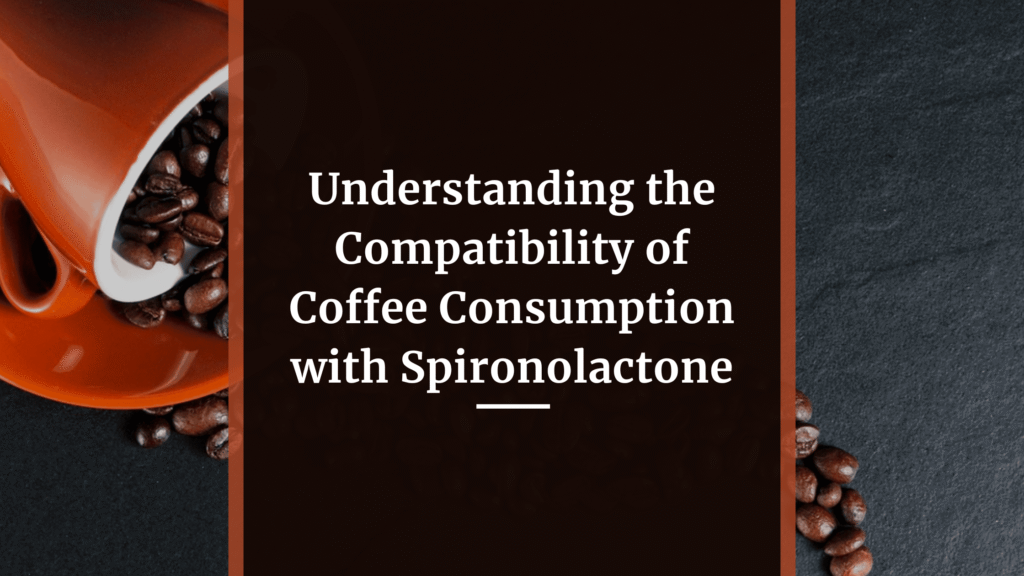If you’re a coffee lover and have recently been prescribed Spironolactone, you may be wondering if you can still enjoy your daily cup of joe. Spironolactone is a medication commonly used to treat conditions like high blood pressure and hormonal acne. In this article, we’ll explore whether it’s safe to indulge in your caffeine fix while taking Spironolactone and discuss any potential interactions or side effects to look out for. So, grab a cup of coffee, and let’s find out if your favorite brew can still be part of your daily routine!
Overview of Spironolactone
What is Spironolactone?
Spironolactone is a medication commonly used to treat various conditions, including high blood pressure, heart failure, and hormonal imbalances. It belongs to a class of drugs known as potassium-sparing diuretics. Spironolactone works by blocking the action of a hormone called aldosterone, which is responsible for the reabsorption of sodium and the excretion of potassium in the kidneys.
How does Spironolactone work?
Spironolactone functions as a competitive antagonist to aldosterone, binding to its receptors in the distal convoluted tubules and collecting ducts of the kidneys. By inhibiting the aldosterone receptors, spironolactone prevents the reabsorption of sodium and water, while promoting the excretion of potassium. This diuretic effect helps to reduce fluid retention and lower blood pressure in individuals with heart failure or hypertension.
Interactions Between Spironolactone and Coffee
Does coffee affect Spironolactone absorption?
The consumption of coffee does not significantly affect the absorption of spironolactone. Therefore, you can enjoy your morning cup of coffee without worrying about it interfering with the effectiveness of the medication. However, it is always advisable to take spironolactone with a full glass of water to optimize its absorption.
Can coffee increase the side effects of Spironolactone?
While not directly increasing the side effects of spironolactone, coffee can exacerbate some of the symptoms commonly associated with the medication. For example, both spironolactone and coffee have diuretic effects, which may lead to increased urination and fluid loss. This can potentially result in dehydration if not managed appropriately.
Are there any health risks associated with combining coffee and Spironolactone?
Combining coffee and spironolactone is generally considered safe for most individuals. However, it is important to note that excessive caffeine intake from coffee can elevate blood pressure, which is contrary to the desired effect of spironolactone. Moreover, excessive coffee consumption may result in electrolyte disturbances, which can further impact the balance of potassium levels affected by spironolactone. Therefore, moderation is key when enjoying your daily cup of coffee.
Effects of Coffee on Spironolactone
Caffeine and Diuretic Effects
Both coffee and spironolactone have diuretic effects, albeit to varying degrees. Caffeine, found in coffee, acts as a mild diuretic and increases the production of urine. Spironolactone, on the other hand, has a more pronounced diuretic effect due to its action on aldosterone receptors. When used together, the diuretic effects of both substances may be compounded, potentially leading to increased urination and fluid loss. This emphasizes the importance of staying hydrated when consuming coffee while taking spironolactone.
Influence on Potassium Levels
Spironolactone is known to increase the excretion of potassium, while coffee has been shown to have minimal impact on potassium homeostasis. However, excessive coffee consumption can deplete overall body fluid levels, potentially altering the electrolyte balance and affecting potassium levels indirectly. It is crucial to monitor your potassium levels regularly, especially if you consume large amounts of coffee while on spironolactone.
Impact on Spironolactone Metabolism
Caffeine, present in coffee, is metabolized in the liver by enzymes such as cytochrome P450 1A2. Some studies suggest that cytochrome P450 enzymes can interact with spironolactone metabolism, potentially affecting its clearance and efficacy. However, the precise mechanism and clinical significance of this interaction are not well-established. It is important to discuss any concerns about drug interactions with your healthcare provider.
Recommendations When Combining Coffee and Spironolactone
Consultation with Your Healthcare Provider
Before combining coffee and spironolactone, it is essential to consult with your healthcare provider. They can provide personalized advice based on your specific medical history, current medications, and individual circumstances. They will consider factors such as your blood pressure, fluid balance, potassium levels, and overall health to determine if coffee consumption should be restricted or monitored closely.
Dosing Considerations
Your healthcare provider may adjust the dosage of spironolactone based on your coffee consumption and its potential effects on blood pressure and fluid balance. They may recommend starting with a lower dose and gradually increasing it while monitoring your response to the medication. Open and honest communication with your healthcare provider is vital for optimizing your treatment plan.
Monitoring Potassium Levels
Regular monitoring of your potassium levels is crucial when combining coffee and spironolactone. This allows healthcare providers to identify any electrolyte imbalances promptly and make necessary adjustments to your treatment regimen. Blood tests can measure your potassium levels and ensure they remain within the desired range. Be sure to follow your healthcare provider’s recommendations for monitoring and reporting any symptoms or concerns.
Potential Risks and Side Effects
Increased Diuretic Effects
Combining the diuretic effects of coffee and spironolactone can lead to increased urination and subsequent fluid loss. This may result in dehydration, especially if you do not consume enough fluids to compensate for the increased urine production. Dehydration can cause symptoms such as dizziness, fatigue, and dry mouth. It is important to stay adequately hydrated while on spironolactone and moderate your coffee intake to minimize the risk of dehydration.
Electrolyte Imbalance
Spironolactone’s primary action is to increase the excretion of sodium while reducing the excretion of potassium. Excessive coffee consumption, especially in large quantities or in combination with other beverages or foods high in caffeine, can impact the overall electrolyte balance in your body. It is essential to keep an eye on your potassium levels, as both spironolactone and coffee can affect potassium excretion. An imbalance in electrolyte levels can lead to various symptoms, including muscle weakness, irregular heart rhythms, and fatigue.
Worsened Spironolactone Side Effects
Spironolactone may cause side effects such as dizziness, headaches, gastrointestinal disturbances, and breast enlargement in some individuals. While coffee may not directly worsen these side effects, it can exacerbate symptoms indirectly by promoting dehydration and electrolyte imbalances. If you experience any concerning side effects while taking spironolactone and consuming coffee, it is crucial to discuss them with your healthcare provider for proper evaluation and management.
Case Studies and Expert Opinions
Studies on Caffeine Interactions with Spironolactone
Research on the specific interactions between coffee (caffeine) and spironolactone is limited. There have been few studies examining the effects of caffeine on spironolactone metabolism or its clinical implications. As a result, the available evidence does not provide clear guidance on the potential interactions between coffee and spironolactone. Further research is needed to gain a comprehensive understanding of this combination’s impact.
Insights from Healthcare Professionals
While scientific literature may be limited, healthcare professionals with experience in treating patients on spironolactone often advise moderation when it comes to coffee consumption. They recommend staying hydrated, monitoring electrolyte levels, and being mindful of caffeine intake. By striking a balance and closely monitoring your response to both coffee and spironolactone, healthcare professionals can offer personalized recommendations to optimize your treatment outcome.
Alternatives to Coffee While Taking Spironolactone
Herbal Teas
If you are looking for caffeine-free alternatives to coffee, herbal teas can be an excellent choice. With a wide variety of flavors and health benefits, herbal teas provide a warm and soothing beverage option without the caffeine content. Some popular options include chamomile, peppermint, ginger, and hibiscus teas. Be sure to check with your healthcare provider if any specific herbal teas may interact with your medications or health condition.
Decaffeinated Coffee
If you still crave the taste of coffee but want to reduce your caffeine intake, decaffeinated coffee can be a suitable alternative. Decaffeination processes reduce the caffeine content in coffee while preserving the flavor. However, it is important to note that decaffeinated coffee is not completely caffeine-free and may still contain trace amounts of caffeine. If you have specific concerns about caffeine’s impact, it is best to consult with your healthcare provider.
Other Caffeine-Free Beverages
In addition to herbal teas and decaffeinated coffee, there are numerous other caffeine-free beverages available to enjoy. These include various fruit juices, infused water, regular water, milk, and non-caffeinated sodas. Opting for these alternatives allows you to maintain hydration without the potential interactions or side effects associated with coffee and caffeine.
Conclusion
Final Considerations
While there is no definitive answer to the question of whether you can drink coffee while taking spironolactone, it is essential to consider individual differences and communicate with your healthcare provider. They can provide personalized guidance based on your specific medical history and treatment goals. By staying hydrated, monitoring potassium levels, and practicing moderation with coffee consumption, you can better manage the potential risks and interactions associated with combining coffee and spironolactone.
Importance of Individual Differences
It is crucial to remember that every individual’s response to medications, including spironolactone, can vary. Factors such as age, weight, overall health, and other concurrent medications can influence how your body processes and responds to coffee and spironolactone. Regular communication with your healthcare provider ensures that your treatment plan is tailored to your unique needs and optimizes your therapeutic outcomes.
Summary of Recommendations
When combining coffee and spironolactone, it is recommended to consult with your healthcare provider, monitor potassium levels regularly, and be mindful of caffeine intake. Moderation and staying hydrated are key to minimizing potential risks and optimizing your overall well-being. Exploring caffeine-free alternatives, such as herbal teas or decaffeinated coffee, can provide a satisfying beverage choice while reducing the potential interactions with spironolactone. Remember, open communication with your healthcare provider is essential to ensure your treatment remains effective and safe.



